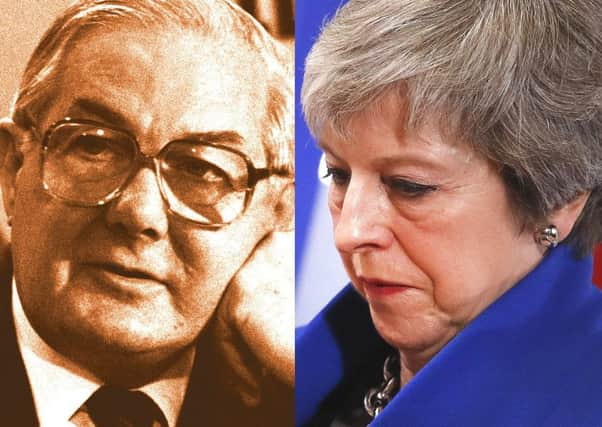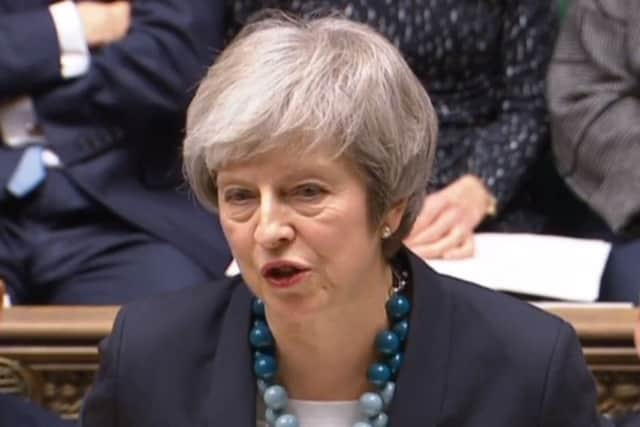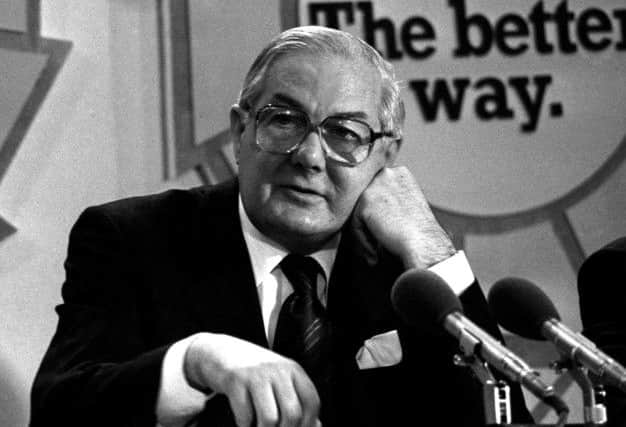Tom Richmond: Amid the Brexit chaos, there is one way for Theresa May to save the day '“ here's how


Forty years ago, James Callaghan faced a similar predicament to Theresa May after the Lib-Lab pact dissolved.
Then, industrial strife was the defining issue. Today, it is Brexit after Northern Ireland’s DUP effectively went on strike.
Advertisement
Hide AdAdvertisement
Hide AdAnd another fundamental difference between past and present politics is deeply ominous.


Mr Callaghan clung on for so long because Parliament was always due to be dissolved in 1979 at the latest.
It was a question of when, not if, and he was brought down when Margaret Thatcher won – just – the first vote of no confidence to be passed in a government since 1924. At least there was an alternative back then. Now there is not – and 2022 is technically the date of the next general election. Yet, while the Fixed Term Parliament Act can be circumvented, as Mrs May did last year, political paralysis looks here to stay.
Advertisement
Hide AdAdvertisement
Hide Ad

A change of Tory leader? Home Secretary Sajid Javid, a Remain supporter, currently has the best approval rating – at minus 18 per cent – and the party’s Eurosceptics will only settle for a true Brexiteer. No one has stature or statecraft to do a better job than Mrs May.
A second referendum? If the question or rules of engagement could ever be agreed, it would be as polarising as the 2016 vote.
A snap election? Instinct suggests another hung parliament, with Jeremy Corbyn potentially able to form a minority government with Lib Dem and SNP support.
However, Labour is divided on Brexit between its metropolitan supporters who support freedom of movement – and voters in the party’s Northern heartlands who want an end to uncontrolled immigration. Yet Mr Corbyn finds himself on the brink of power – in spite of being at odds with most moderates in his Parliamentary party – because Mrs May’s reputation for duty and diligence has now been terminally compromised.
Advertisement
Hide AdAdvertisement
Hide AdFirst, she categorically ruled out a snap election after succeeding the disastrous David Cameron – remember him? – and then went back on her word and called a poll which backfired when she lost her majority.
Next, Mrs May said – ad infinitum – that a no deal Brexit was better than a bad deal. Yet her Withdrawal Agreement achieved the impossible – and united Remain and Leave supporters in their condemnation.
And, finally, she maintained that her deal would be put to a Commons vote – she even opened the five-day debate in Parliament on Tuesday last week – before pulling it when the scale of the defeat, obvious from the start, became apparent.
Imagine calling off a Test match at the halfway point because conditions did not suit one side. Mrs May’s sporting hero, Geoffrey Boycott, would be the first to say: “It’s not cricket.”
Advertisement
Hide AdAdvertisement
Hide AdEven though Mrs May is ultimately responsible for the Government, I don’t entirely blame the Tory leader for her predicament. She has genuinely tried to do her best after being dealt an impossible hand by her party and the electorate. She’s also been badly let down by her advisers who appear tell their boss what they think she’d like to hear rather than what she needs to know; there’s a difference.
And who are they? Chief whip Julian Smith – the Skipton and Ripon MP – should have been sacked for repeatedly misjudging levels of support, including MPs voting last week to hold the Government in contempt of Parliament for obfuscating over the release of the Brexit legal advice.
Chief of staff Gavin Barwell only got the job because he lost his seat last year – hardly a ringing vote of confidence – while Mrs May’s chief adviser, Olly Robbins, stands accused of sidelining two Brexit Secretaries and other ministers.
And it is why, with just over 100 days to go before Britain’s planned departure from the EU, radical action needs to considered if the distraction of a Tory leadership election is to be avoided – or a vote of no confidence in HM Government which results in neither Mrs May or Mr Corbyn being able to form a viable administration and an election entails early next year.
Advertisement
Hide AdAdvertisement
Hide AdIt needs a team of senior Parliamentarians, and the country’s most experienced and respected civil servants, to be formed in the national interest to try and reach a policy position on Brexit that is agreeable to MPs – and also the EU.
Given the current default option is a no deal Brexit, a scenario which will not command Commons support because it is only backed by right-wing ideologues, Mrs May must do what she should have done on day one and reach out to senior statesmen, political opponents and business leaders.
If it means forming a national government in order to harness the goodwill shown towards her by the Archbishop of York and David Blunkett, the former Home Secretary, whose supportive contributions in The Yorkshire Post have been dismissed by the more arrogant Tories, it might – just – save the day before Britain faces years, and possibly decades, of political, economic and social discontent because this country’s leaders lost the plot and forgot the people that they purport to represent.